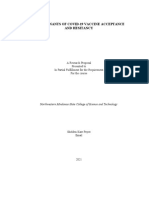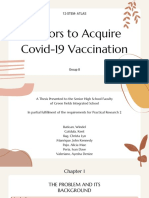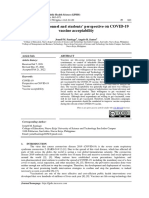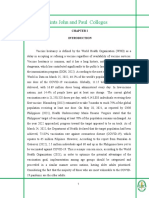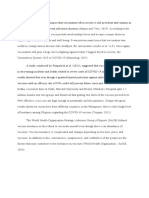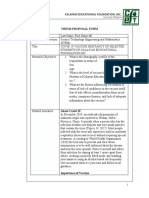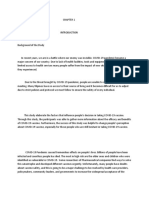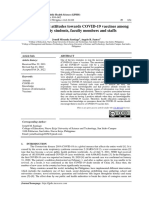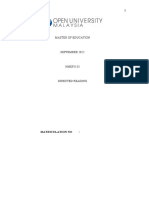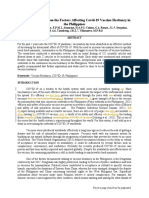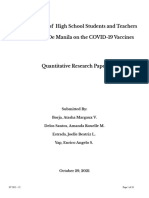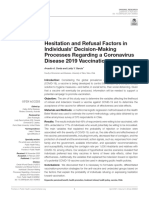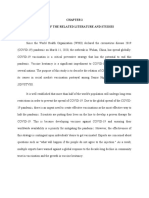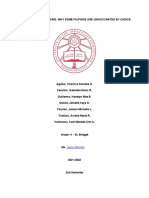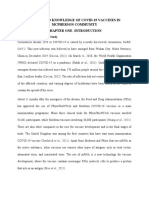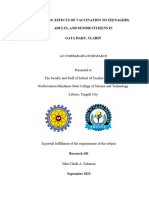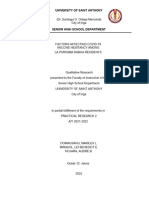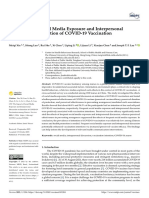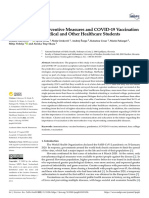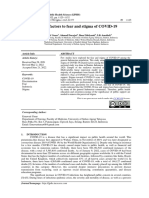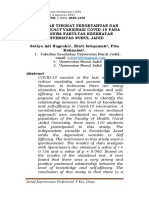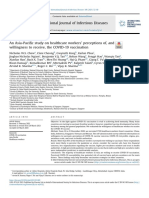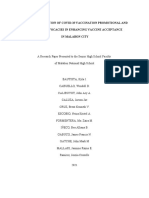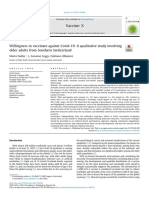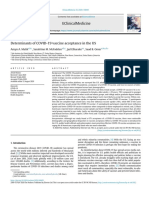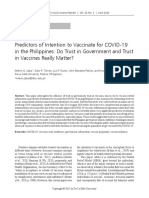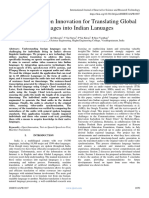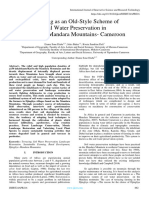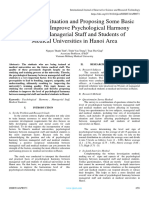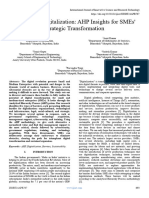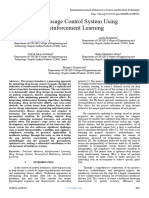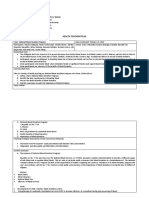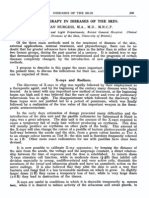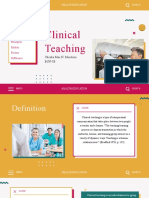Professional Documents
Culture Documents
Exploring COVID-19 Vaccine Hesitancy Continuum From The Experiences and Beliefs of Social Studies Students in LNU
Original Title
Copyright
Available Formats
Share this document
Did you find this document useful?
Is this content inappropriate?
Report this DocumentCopyright:
Available Formats
Exploring COVID-19 Vaccine Hesitancy Continuum From The Experiences and Beliefs of Social Studies Students in LNU
Copyright:
Available Formats
Volume 7, Issue 6, June – 2022 International Journal of Innovative Science and Research Technology
ISSN No:-2456-2165
Exploring COVID-19 Vaccine Hesitancy
Continuum from the Experiences and
Beliefs of Social Studies Students in LNU
Irish R. Depalco; Amor P. Agnila; Ramon NiñoBarcinal; April Joy M. Jacutina; Sarah Faith P. Lacandazo; Angela P. Narido;
Ervin H. Ocasla; Jennelyn P. Palagar; Melody M. Telimban
Leyte Normal University Tacloban City, Leyte 6500, Philippines
Abstract:- The COVID-19 pandemic is a global health As part of the global effort, the scientific community,
concern that caused massive disruption to almost all together with the multilateral organizations and the
aspects of human life. Hence, the scientific community pharmaceutical industry worked together to develop and
developed vaccines to reduce the risks of the virus. manufacture vaccines to fight COVID-19. Globally, more
Vaccination against COVID-19 has been rolled out to than 21 vaccines have been approved for general, and
countries worldwide, including the Philippines, in the emergency use and are currently rolled out in different
effort to attain herd immunity. Yet, despite the countries (The COVID19 vaccine race – weekly update,
vaccine’s availability, people continue to express 2022), including BioNTech, Pfizer vaccine, CoronaVac
hesitancy. This study explores the COVID-19 vaccine vaccine, Covaxin, Johnson & Johnson, Moderna, Novavax,
hesitancy from the experiences and beliefs of Social AstraZeneca, Sinopharm, and Sputnik V vaccine. These
Studies students in LNU. A case study design was used vaccines, on the other hand, were developed in a short
to gain deep insights into how the experiences and period and were mass-produced due to the immediate
beliefs of Social Studies students shaped vaccine impact of the coronavirus on countries across the globe
hesitancy. Employing Thematic Analysis, the research (Amit et al., 2022). Despite scientific evidence asserting
findings are: (1) the common reasons for vaccine that these vaccines are safe, countries worldwide face
hesitancy of Social Studies students are, family various challenges, including vaccine hesitancy and anti-
pressure, health concerns, and the perceived necessity of vaccination sentiments (Amit et al., 2022). Vaccine
vaccination, other factors include religious belief and hesitancy, as defined by the World Health Organization, is
vaccine efficacy, (2) the hesitant students expressed a “the delay in acceptance or refusal of vaccination despite
positive outlook towards new health protocols stating the availability of vaccination services.” It is considered
that it is implemented for the good of the majority, one of the top ten threats to global health despite evidence
however, they are aware and have experienced mobility of the vital role of vaccination in improving population
restrictions in entering commercial establishments and, health outcomes (McDonald et al., 2015). Previous research
(3) lastly, the vaccine-hesitant students are aware of also shows that vaccination hesitancy is widespread
their immunity as unvaccinated and their social worldwide, with wide variation in the reasons given for
acceptance in the community they belong. vaccine refusal (Wagner et al., 2019). The Philippines, for
instance, has faced these problems since the vaccination
Keywords:- Vaccine Hesitancy, experiences, beliefs, Social rollouts that started last March 2021 (Amit et al., 2022).
Studies students, Case Study, Reasons for vaccine hesitancy Only 55% of Filipinos expressed willingness to vaccinate
against COVID-19, and as of September 16, 2021, only
I. INTRODUCTION 30% of the population has been vaccinated (Amit et al.,
A. Background of the Study 2022). Various factors influenced the vaccine hesitancy of
The novel coronavirus (COVID-19) outbreak caused by Filipinos including a lack of trust and confidence in the
the widespread effects of the Severe Acute Respiratory safety and effectiveness of vaccines. Such lack of trust
Syndrome Coronavirus 2 (SARS-Cov-2) has profoundly stems from the social trauma due to the Dengvaxia
affected almost all aspects of life including health, controversy (Dayrit, et al., 2020).
economic activities, and education. While the current To gain a nuanced understanding of this case, various
COVID-19 pandemic is starting to develop a significant research was conducted to determine the reasons for the
drop around the world, one cannot disregard the over 5 COVID-19 vaccine hesitancy among different groups of
million deaths and close to 300 million reported cases people. For instance, in a study conducted by Troiano &
worldwide, as of January 2022 (Worldometers, 2022). Nardi (2021), Black/African individuals were found to have
These notable devastating effects of the pandemic, a lower acceptance rate of the vaccine as did individuals
including the high mortality rate, underscored the need for with low education. On the other hand, in the case of
vaccination against COVID-19. Furthermore, social medical students in India, vaccine hesitancy is shaped by
distancing measures and movement restrictions have been various factors including vaccine efficacy, fear of possible
introduced for risk prevention measures. side effects, and societal pressure (Jain, et al., 2021). While
a study of Filipino housewives by Espiritu et al. (2022),
vaccine hesitancy stems from fear, which many housewives
are still afraid of its possible consequences on their bodies,
IJISRT22JUN1365 www.ijisrt.com 1150
Volume 7, Issue 6, June – 2022 International Journal of Innovative Science and Research Technology
ISSN No:-2456-2165
the news they read on social media about people's B. Statement of the Problem
experiences following vaccination, and the fear of dying Despite the availability of vaccines and the vaccination
after being vaccinated. campaigns conducted by higher educational institutions,
including the Leyte Normal University, some students
Several studies also found aspects such as remain hesitant about vaccination. Hence, this study aims
sociodemographic, and psychological, that foster vaccine to explore the vaccine hesitancy of Social Studies students
hesitancy (Abdulmoneim et al., 2021; Troiano &Nardi, at Leyte Normal University. At this stage in the research,
2021). Findings of these studies revealed that education vaccine hesitancy will be defined as the “delay in
was cited as part of the socio-demographic factor that acceptance or refusal of vaccination despite the availability
influenced one’s decision to be hesitant toward vaccination of vaccination services.” (World Health Organization).
(Troiano &Nardi, 2021). Another determinant of vaccine Specifically, this study aims to answer the following
hesitancy is rooted in relationships with friends and family questions:
(social factors) that significantly impact those afraid to be Why some Social Studies students are hesitant toward
vaccinated. Hearing favorable and unfavorable comments COVID-19 vaccination?
about vaccines or their adverse effects substantially affects How do unvaccinated Social Studies students describe
their decision-making process (Thompson, 2021). their decision toward COVID-19 vaccine hesitancy?
Moreover, Murphy et al. (2021) also found that those who How do unvaccinated Social Studies students respond
were vaccine-hesitant, as well as those who were resistant, toward health protocol/new usual standards imposed by
were more self-serving, held strong religious viewpoints, commercial establishments and government institutions?
and held an internal locus of control. What are the idea/s of unvaccinated Social Studies
Media misinformation also holds a strong influence on students as to what will happen for those unvaccinated
people’s hesitancy. Different fake news and misinformation individuals in terms of their:
circulating on various internet platforms lead people to not immunity?
adhere to the health-preventive measures recommended by mobility?
the health experts. According to Gudi, et al. (2021), as cited social acceptance?
in Kricorian&Equils (2021), misinformation about the C. Theoretical Framework
safety of COVID-19 vaccinations gains traction in people's The theoretical underpinnings of this study are the
minds as it builds on previous worries, fosters doubt, and a Theory of Planned Behavior and 5C of the psychological
skeptical attitude toward vaccines, and prevents individuals antecedent of vaccination. The Theory of Planned Behavior
from becoming vaccinated. In the case of college students, was established by IcekAjzen as an attempt to anticipate
a study by Silva et al. (2021) social media misinformation human behavior at a certain time and place, in which an
about vaccines is a major barrier to vaccine acceptance. individual’s "belief structure" ultimately determines his or
Previous studies were able to determine various her intention to engage in a particular behavior (Azjen,
factors of vaccine hesitancy from different groups of 2021). As applied to the context of the COVID-19 vaccine,
people. Yet no studies were conducted to explore vaccine belief structure consists of attitude toward the COVID-19
hesitancy in the case of education students, particularly vaccine (i.e., its perceived necessity, benefit, and
Social Studies majors. Given this, the researchers decided effectiveness), subjective norms (i.e., whether significant
to conduct this study to explore the experiences and beliefs others support getting a COVID-19 vaccine or not), and
of hesitant students. Given the present situation that LNU is perceived behavioral control (i.e., the degree to which
providing free vaccines to students, yet despite the COVID-19 vaccination is perceived to be within the
availability of vaccines, there are still individuals who individual's control) (Guidry, et al., 2020).
remain hesitant. This research will focus on unvaccinated Apart from the TPB, this study is also theoretically
Social Studies students of Leyte Normal University and driven by the 5C psychological antecedent of vaccination
explore their experiences and beliefs that influence them to proposed by Bestch et al. (2020) to further explain
be hesitant towards vaccination. It is relevant to consider vaccination behavior. It includes confidence (trust in
vaccine hesitancy among Social Studies students who are vaccine efficacy, safety, and necessity, and the system that
also at a high risk of being infected by the COVID-19 virus delivers it), complacency (perceiving the disease as low
because as pre-service teachers it will be a barrier to risk), barriers (perceived low vaccine availability,
participating in face-to-face classes and internships. affordability, and accessibility), the calculation (analyzing
Moreover, experiencing severe COVID symptoms could the positives and 6 negatives of vaccination), and
result in hospitalization and death, which will prevent them responsibility (willingness to take the vaccine for protecting
from functioning as active members of society (Hamdam et others via herd immunity).
al., 2021).
These two theoretical underpinnings will guide the
researchers to understand the reasons behind vaccine
hesitancy of unvaccinated Social Studies students.
IJISRT22JUN1365 www.ijisrt.com 1151
Volume 7, Issue 6, June – 2022 International Journal of Innovative Science and Research Technology
ISSN No:-2456-2165
D. Scope and Delimitation c) LNU
The general intent of this study is to explore the vaccine Conceptually defined as Leyte Normal University,
hesitancy of vaccine-hesitant Social Studies students based a nonprofit public higher education institution
on their experiences and beliefs. This study will mainly located at Paterno Street, Tacloban City.
encompass. Social Studies students of Leyte Normal who Operationally defined as a public state University
have not received their vaccination until March 21, 2022. where the participants are currently studying.
Moreover, the participants will be selected using purposive
sampling. Additionally, this study will be conducted in the II. REVIEW OF LITERATURE
province of Leyte, where the selected participants reside.
The scope and delimitation of this study suggest that the This chapter discusses the pieces of literature to which
results could not be generalized to the experiences and the present study is related or has some similarities. This
beliefs of other university students who are hesitant to get gives the authors the background in understanding the
COVID-19 vaccines. study.
E. Significance of the Study III. FACTORS INFLUENCING VACCINE HESITANCY
This study aims to be beneficial to the following:
Local Government Unit. This study will benefit the A. Societal Factors
Local Government Unit-Interagency Task Force According to the study by Morales et al. (2022) on
(IATF) in promoting confidence in the effectiveness COVID-19 vaccine hesitancy determinants, social groups
and safety of the COVID-19 vaccines. This will help of the identified hesitant individuals greatly influence
Local Government Units improve their imposition of fostering and reinforcing vaccine hesitancy. According to a
health protocol, mobility restrictions, and information Kaiser Family Foundation poll (KFF,2021), one of the most
campaigns to gain public trust and instill public faith prevalent reasons for altering one's attitude is seeing family
in vaccine efficacy and the institutions that oversee and friends vaccinated safely and without adverse effects.
the immunization effort. On the other hand, those who decline vaccination cite
Health Institutions/Authorities. Health experts can evidence from relatives and friends that they have also
get some cues or relevant information about how experienced brief adverse effects from the vaccine. Many
some sectors, particularly students, view or reasons underlined the importance of their friends, family, and
behind vaccine hesitancy given the prevailing doctors in getting them to receive the vaccine. These
condition of emergency use permits of this COVID-19 individuals have been convinced after observing their
vaccine. friends and relatives obtain immunizations without
experiencing severe side effects, conversing with family
Future Researchers. The findings of this study will members about the prospect of traveling safely, and
be of help as reference material to future researchers
discussing their risks with their physicians (Wingfield,
interested in exploring vaccine hesitancy among
2021). In support of this, Dr. Amesh Adalja, a senior
college students. This study will also contribute to the
scholar at the Johns Hopkins Center for Health Security in
building blocks of knowledge for future researchers in
Baltimore, agreed with the study's conclusions that friends,
the same field of interest.
family members, and trusted individuals were the most
F. Definition of Terms important predictors of vaccination status. Relationships
a) Vaccine hesitancy with friends and family significantly impact those afraid to
It is conceptually defined as "delay in acceptance be vaccinated. Hearing 10 favorable and unfavorable
or refusal of vaccination despite the availability of comments about vaccines or their adverse effects
vaccination services.” (World Health substantially affects their decision-making process
Organization). (Thompson, 2021). Moreover, studies on the motivations
for vaccinations found that social groups comprised of
It is operationally defined as the delay of Social
family and friends could provide either incentives for or
Studies students in taking COVID-19 vaccines
barriers to vaccination (Person et al., 2020; Stout et al.,
despite the availability of vaccines.
2020). Siu et al. (2022) also mentioned that participants
b) Herd Immunity who were cautious regarding vaccination had friends and
Conceptually defined as inoculating a large portion family members who were similarly uncertain about having
of the population. their vaccinations.Furthermore, vaccine hesitancy of
Operationally defined as vaccinating a large medical students claims that vaccination is necessary to
portion of the population to people against the resume face-to-face classes and get their personal life back
COVID-19 virus and mitigating the spread. together (Jain et al., 2021). Koo et al. (2021) pointed out
that awareness of the social consequences of COVID-19
can encourage hesitant individuals to vaccinate or adopt
prosocial and altruistic behaviors, such as receiving the
vaccination. On the other hand, Dube et al. (2013) suggest
that if COVID-19 vaccination is perceived as a social norm
or those around you or whom you respect will be
vaccinated, this might persuade hesitant individuals to
receive their vaccination.
IJISRT22JUN1365 www.ijisrt.com 1152
Volume 7, Issue 6, June – 2022 International Journal of Innovative Science and Research Technology
ISSN No:-2456-2165
B. Trauma, anxiety, and fear for residents in UAE following their vaccination. It was
According to Vergara (2021), the Philippines found in the study that adverse effects of both the
experienced one of the most controversial vaccinations in inactivated and mRNA vaccines developed mostly within
history that mainly impacted children. This social trauma 24 h of vaccination and about 95% were mild requiring no
caused by the Dengvaxia controversy resulted in high or home-based treatment. The adverse effects are more
vaccine hesitancy among Filipinos as early as 2018. In the likely to be systemic side effects and younger individuals,
same study, Vergara asserted that the traumatic experience females, and people with comorbidities.
of Dengvaxia vaccines reduced the vaccine confidence of
Filipinos, particularly in Chinese manufactured COVID-19 While the Center for Disease Control and Preventions
vaccines. For instance, in the 2021 Social Weather Survey, (2022) listed vaccination exemptions only for individuals
63% of adult Filipinos prefer American and European with “severe allergic reaction (e.g., anaphylaxis) after a
manufactured vaccines compared to China, which has a previous dose or to a component of the COVID-19 vaccine
19% vaccine confidence rate. This vaccine preference and immediate allergic reaction of any severity to a
impacted the subsequent vaccination efforts, including the previous dose or known (diagnosed) allergy to a component
COVID-19 vaccination. of the vaccine.”
On the other hand, when vaccination requires an D. Vaccine brand preference and efficacy
injection, fears contribute to vaccine apprehension. On the one hand, a study by Amit et al. (2022) asserted
Irrational concern or anxiety can cause an internalized that brand preference among COVID-19 vaccines was one
stress response, manifesting as vasovagal responses eerily of the reasons for vaccine hesitancy in the Philippines. The
similar to vaccination side effects and reactions study further stated that when the Philippines administered
(Entertainment Times, 2021). According to Rush (2021), its first procured vaccine which was SinovacCoronaVac, a
when vaccines are rolled out across the country, various Chinese biopharmaceutical manufactured vaccine,
mental health disorders may interfere with vaccine participants questioned the effectiveness of the vaccine,
compliance. Anxiety and panic attacks, specific phobias especially since this was given to health workers despite the
such as trypanophobia or needle phobia, agoraphobia, lack of published data on its significance at the time and
obsessive-compulsive disorder (OCD), and unresolved initial announcements that these were not recommended for
trauma, which can afflict black and brown communities, high-risk individuals. In a similar study, participants also
are among the mental health problems that are especially cited that other 12 countries do not recognize Sinovac
vulnerable to vaccine and fear. They are unable to receive Coronovac. Therefore, they wanted to wait for different
the vaccine due to mental health difficulties. In Greene brands of vaccines to be administered.
County, people claim that politics is not the most influential
factor in their vaccine beliefs but their primary concern is Another factor that contributes to COVID-19 vaccine
anxiety – fear that the vaccine was produced hastily and hesitancy is its efficacy. For instance, in the Philippines,
that long-term adverse effects are unknown (Hoffman, vaccine safety and efficacy issues surged on different media
2021). platforms. According to Gonzales (2021), the numbers of
individuals who are hesitant to take COVID-19 vaccination
C. Health Concerns shots are concerned about the vaccines' safety and efficacy,
Another reason why individuals express hesitancy as indicated by two Department of Health polls (DOH). As
towards COVID-19 vaccination is health concerns, further cited in the article of Gonzales (2021), the DOH
particularly its side effects. According to Entertainment Philippines, conducted an online survey with over 43,000
Times (2021), COVID-19 vaccination side effects are replies from all priority categories, according to Health
rarely pleasant, and the fear of experiencing them has Undersecretary Maria Rosario Vergeire, to determine why
actively discouraged many individuals from receiving the people refused immunizations. During an online press
vaccine. The majority of reactogenic adverse effects are conference, she revealed that the top three reasons
temporary inflammatory reactions. Although reactogenicity individuals are hesitant to be vaccinated, according to a
is influenced by numerous variables, including host survey, are as follows: To start, they are concerned about
characteristics (age, gender, etc.), vaccination type, the potential negative implications. Second, as a result of
composition, method of administration, and others unfavorable information spread through social media.
(Laupèze et al., 2019). Third, they are skeptical of the vaccines' efficacy. A similar
assertion can be seen in the study of Eleje et al. (2021), in
Moreover, a study by Molla (2021) explains why which they assert vaccine efficacy stems from the concern
some individuals are reluctant to receive the vaccine and of the alleged inability of the vaccine to protect against all
what might be done to change their thoughts. Forty-five known strains of COVID-19(20/108), as well as the cold
percent of those who stated they would definitely not get chain storage challenges (26/108) usually encountered in
the vaccine cited unpleasant effects as a reason, and forty- Nigeria. Similarly, in the Philippines, vaccine efficacy has
five percent cited cost. Nevertheless, the report suggests been the primary concern of hesitant individuals in which
that immunization campaigns should address the fear of COVID-19 vaccines are viewed as insufficient in solving
adverse effects, which is one of the primary reasons why the COVID-19 pandemic (Amit et al., 2022).
some individuals refuse to get vaccinated. And to shed light
on this concern, Ganesan et al. (2022) conducted a study to
find out the possible side effects of the COVID-19 vaccine
IJISRT22JUN1365 www.ijisrt.com 1153
Volume 7, Issue 6, June – 2022 International Journal of Innovative Science and Research Technology
ISSN No:-2456-2165
E. Religious Affiliation/Beliefs with chronic illnesses such as diabetes and heart disease
A study by Garcia & Yap (2021) asserted that religious were more susceptible to severe COVID-19 infections
affiliations and beliefs are associated with vaccine (Khabour et al., 2020).
apprehension or hesitancy. According to them, vaccination
hesitancy among devotees results from spiritual teachings On the other hand, a study conducted in Nepal
prioritizing prayers over medicine. Lack of appropriate revealed that respondents had a high awareness of COVID-
knowledge of the available vaccines, some devotees seek 19, personal preventative measures, and population-level
divine interventions, using or accepting alternative means solutions. They stated that the utilization of masks, hand
to disease treatment, such as the use of holy water and sanitizers, hand washing, and proper lockdown would assist
prayers, out of fear that vaccination may result in the death in the prevention of the disease (Bhatt et al., 2020). In the
of their children. In other religious beliefs, such as Islam’s same study, there was a positive perception of universal
case, vaccines with pork derivatives are prohibited from safety measures for COVID19. However, negative
being given to children. Moreover, believers are eager to perceptions also existed, such as COVID-19 attacking only
adopt alternative techniques for disease cure, such as water older people and coughing into the elbow was not good
and prayers since they fear vaccination would kill their practice to prevent the spread of the virus (Singh et al.,
children (Espiritu et al., 2022). Additionally, religious and 2020). Similarly, participants from a study conducted by
philosophical traditions promote different views on Vadivu and Annamuthu (2020) believed that quarantine,
vaccination. Religious opposition to vaccines is generally social distancing, and face masks could break the chain of
based on ethical dilemmas associated with using human COVID-19 spread.
tissue cells for vaccine creation and beliefs that the body is
sacred. It should not receive certain chemicals, animal Moreover, in terms of mobility restrictions, according
blood, or tissues and should be healed by God or natural to Mayo Clinic (2021), public health restrictions due to the
means (Espiritu et al., 2022). In support of this, according COVID-19 outbreak have canceled festivals, concerts, and
to McCausland (2021), the Christian argument for religious other events. Numerous vacations and huge gatherings have
exemptions often follows two tracks: first, the vaccination been delayed or postponed. For those still unvaccinated,
doses were manufactured using aborted fetal cell lines, and close contact with people who do not live with them
the human body is the temple of “God's Holy Spirit” and increases the chance of infection with the virus that causes
therefore acquiring a vaccine would be a sin. In addition, COVID-19. That is why, if they have not received a
some religious communities believe that the virus poses no COVID19 vaccine, any activity that permits them to
threat to Christians because the blood of Jesus is powerful maintain a social distance, at least 6 feet (2 meters), from
enough to shield them from disease (Kuhn, 2021). In others is considered low risk. Numerous activities are
connection with this, Stevenson (2021) asserts that available close to home, whether visiting a favorite public,
Christians frequently say that being forced to take the state, or national park or simply spending time in one's
vaccination is a violation of their religious beliefs because neighborhood (Espiritu et al., 2022).
their bodies are considered sacred temples that must be kept According to Queensland Government (2021),
clean. unvaccinated individuals will be prohibited from visiting
F. Vaccination decision-making vulnerable environments, including hospitals, residential
Attitudes toward vaccination cannot be classified as aged care, disability accommodations, and jails, from 17
anti- or pro-vaccine but rather as a continuum between total December 2021. It does not apply to residents or patients of
acceptance and open refusal of some or all immunizations these institutions, and medical care, end-of-life visits,
(Kumar et al., 2016). The epidemiological triangle, which childbirth, and emergency scenarios will be exempted. The
describes the complex interaction of 14 environmental (i.e., gap between vaccinated and unvaccinated people will
external), agent (i.e., vaccination), and host (or parent)- undoubtedly expand as authorities in the United States and
specific characteristics, can be used to explain vaccine Europe seek or impose tighter restrictions on people who
hesitancy. Moreover, research has shown that vaccination have not received a COVID19 vaccine (Ellyatt, 2021).
decision-making should be studied and understood in a Although most governments have yet to make
broader socio-cultural context as vaccination is part of a COVID-19 immunization mandatory for their citizens, a
"wider social world." Its decision-making is influenced by few have established vaccination cards that give vaccinated
various social factors such as past experiences with health people more freedom and career opportunities than
services, family histories, feelings of control, and unvaccinated ones. COVID-19 immunization status is
conversations with friends (Stefanoff et al., 2010). increasingly influencing freedom to travel, work, engage,
G. Perceptions toward new standard health protocols and enjoy leisure activities. For instance, in the Philippines,
In terms of the mandatory vaccination policy, a study by as COVID cases start to surge due to the new COVID
Graeber et al. (2021) reveals that a mandatory vaccination variant (Omicron) the Philippine government banned
would almost certainly achieve herd immunity against unvaccinated individuals in Manila from public transports
COVID19 since all those for whom there is no medical with its “no vaccination, no ride policy (Al Jazeera, 2022).
contraindication would also get vaccinated. About half of
the respondents approve and disapprove of such a
mandatory vaccination policy. At the same time, most
participants (95%) agreed that the elderly or individuals
IJISRT22JUN1365 www.ijisrt.com 1154
Volume 7, Issue 6, June – 2022 International Journal of Innovative Science and Research Technology
ISSN No:-2456-2165
H. Immunity and social acceptance of unvaccinated IV. METHODOLOGY
individuals
In terms of immunity, according to Espiritu et al. A. Research Design
(2022), unvaccinated individuals think that their natural This study is qualitative research and will employ an
immune system will protect them against COVID-19 explanatory case study design. According to Dudovskiy
disease if they are healthy. They further explained that if (2011), an explanatory case study aims to answer 'how' or
hesitant individuals have any health problems, they may 'why' questions with minimal influence over the occurrence
worry that even mild or transient side effects from the of events on the researcher’s part. Moreover, based on the
vaccine could cause diseases their body cannot handle. Chinese Government Scholarship (2018) reviews,
Therefore, these immunizations are unnecessary or explanatory research does not give the researchers
potentially dangerous in their eyes. Hesitant individuals conclusive evidence. Nevertheless, it helps the researchers
may perceive that they have natural solid immunity that to understand the problem more efficiently. This research
would protect them from a viral infection. Johns Hopkins design will allow participants to thoroughly explain their
medicines explicitly explained that whether or not an experiences and beliefs about their apprehension toward
individual was infected by COVID-19, getting the COVID- COVID-19 vaccination. The participants will also provide
19 vaccine is the best protection against COVID-19. information that will determine the cause and effect of their
Various studies supported this claim; for instance, the U.S. hesitation to take COVID-19 vaccines. Additionally, this
Centers for Disease Control and Prevention (CDC) released type of qualitative research design will enable the
a report on Oct. 29, 2021, that says getting vaccinated for researchers to conduct in-depth interviews and use open-
the coronavirus when you’ve already had COVID-19 ended questions, which will provide richer data in a
significantly enhances your immune protection and further comprehensive understanding of the research problem.
reduces your risk of reinfection.
B. Research Locale
Vaccine hesitancy is a varied group (Larson & This study will be conducted within the Province of
Broniatowski, 2021). Hesitation manifests in a variety of Leyte, where the participants reside.
ways, including postponing vaccination due to safety
concerns, anxiety based on individual or group experiences
from the past, and doubts over COVID-19 immunizations.
Individuals who oppose vaccinations are not necessarily
"anti-vaxxers," but they may seek information from anti-
vaccine organizations to support or contradict their
concerns. Consequently, vaccine-hesitant individuals are
persuadable by anti-vaccine advocates. In addition, they
risk being judged or labeled "anti-vaccine" by the very
people who are best suited to encourage healthy behaviors:
health care providers. Attwell& Smith (2017) reinforced
this assertion by noting that self-esteem is central to Social Fig. 1
Identity Theory in which membership in highly respected
C. Participants of the Study
groups enhances individuals' self-esteem. They further
The participants will be selected based on their
stated that vaccine-reluctant persons and vaccine-accepting
knowledge and experience of the subject (Manen, 2014). In
individuals alike view themselves as intelligent. Therefore,
determining the participants, the researchers will employ
it influences their immunization decisions.
purposive sampling. Participants will be purposely selected
The general trend of previous studies was focused on based on their ability to illuminate the information needed
the vaccination perception of parents, elders, and for investigating the specific case of the vaccine. This will
professionals while putting on little emphasis on college allow the researchers to precisely describe the population's
students. These gaps on the issue of vaccine hesitancy characteristics (Johnson &Christense, 2014). The
provided limited in-depth investigation of the experiences participants will be chosen based on a single criterion:
and beliefs of college students, particularly Social Studies unvaccinated since March 21, 2022. Therefore, the
students who are hesitant to acquire vaccines. Based on the participants of this study are the unvaccinated Social
researchers’ knowledge, this research will be the first to Studies students at Leyte Normal University, residing
study vaccine hesitancy of unvaccinated Social Students in within the province of Leyte, and are willing to participate.
LNU. To further explain this type of sampling technique, Nueman
(2009), as cited in Bakar & Ishak (2014), explained that
purposive sampling is an appropriate sampling procedure in
qualitative research, particularly when it involves selecting
participants for special situations to gain a deeper
understanding of the specific case.
IJISRT22JUN1365 www.ijisrt.com 1155
Volume 7, Issue 6, June – 2022 International Journal of Innovative Science and Research Technology
ISSN No:-2456-2165
D. Data Collection Method F. Research Reflexivity
In this study, the researchers will utilize face-to-face COVID-19 exposed how healthcare system weaknesses
and online semi-structured interviews to elicit the can have enormous consequences for health, economic
participants' thoughts, opinions, and experiences about advancement, public trust in the government, and social
COVID-19 vaccine hesitancy. A semi-structured interview cohesion. As part of the global effort to contain the spread
is commonly used in qualitative studies in which the of the virus, the Philippines took steps to mitigate the virus
researchers prepare a specific set of open-ended questions through the procurement of vaccines and inoculating a high
that will be supplemented with follow-up questions share of the population. Some educational institutions, for
(Adams, 2015). Additionally, open-ended questions will instance, the Leyte Normal University, have joined in the
further help the researchers establish conversations with the effort to provide free vaccines to its students.
participants, who will openly share their beliefs and
experiences about their hesitancy toward the COVID-19 However, challenges arise in this vaccination
vaccination. Furthermore, interviews will be conducted campaign as people become hesitant about vaccination.
where the participants are safe and convenient. While medical experts assert that getting vaccinated is a
primary step in fighting against COVID-19, this has
On the other hand, the researchers intend to conduct become the most significant challenge since many are still
an informal interview with the participant’s family reluctant to be vaccinated. This study will examine vaccine
member/s in instances that data will need nuance hesitancy, particularly in the case of unvaccinated Social
elaboration. With this, the researchers will use an interview Studies students. It is noteworthy that the researchers are
guide to ensure that essential questions concerning the also Social Studies students who might have experienced
participant’s responses will be addressed. the same situations as the participants. Hence, to avoid
being partial and biased, the researchers guarantee that they
Before the actual interview, the researchers will will remain neutral whatever the results would be.
provide an invitation letter. Once the participants agree, the Therefore, the results will be analyzed based on the
researchers will seek their approval through the informed participant's point of view.
consent form. The informed consent form will be given
days before the interview to give the participants enough G. Data Analysis
time to review their participation. The researchers will After gathering the data, all the responses provided by
guarantee that the discussion will be conversational and the participants will undergo qualitative data analysis. And
that there are no right or wrong answers. Moreover, the then, the researchers will carry out identification,
information the participants share will be treated with investigation, examination, and interpretation. The
utmost confidentiality. Interviews will be audio-recorded, fundamental qualitative data analysis process will begin
and the participant's responses will be transcribed and will once the data has been codified and organized. Afterward,
undergo analysis and interpretation. the researchers will use the data and information to find
relevant patterns and themes behind their responses from
E. Ethical Consideration the online interview. Specifically, the researchers will use
The researchers will ensure that ethical standards Thematic Analysis. As defined by Braun and Clarke,
established for academia and research will always adhere thematic analysis, as cited in Kiger and Varpio p. 2 (2020),
to. The researchers will always get signed informed consent "is a method for analyzing qualitative data that entails
from the participants before conducting the interview. searching across a data set to identify, analyze, and report
Hence, the researchers will provide a consent letter repeated patterns.” The researchers will further employ a
showing the participant's grant of permission. Furthermore, six-phase process of thematic analysis:
the researchers will also ensure participants' anonymity and
avoid disclosing their personal information and responses. Step 1: Familiarization with the data set. It entails
The ethical letter shall also serve as a data privacy waiver repeated and active reading through the data (Braun &
following the ethical standards and Republic Act 10173 or Clarke, 2006).
the Data Privacy Act of 2012. Step2: Generating Initial Codes. Coding is the process of
organizing the data by bracketing chunks (or text or
Moreover, the participants have the right to withdraw image segments) and writing a word representing a
their participation and will not be forced to join the category in the margins (Rossman & Rallis, 2012).
research team. Any discriminatory acts, unnecessary and Step 3: Searching for themes. The researchers will find
offensive words or phrases formulating the research patterns in the numerous codes developed and create
questions, and the actual conduct of the interview will be themes. A thematic map will also help the researchers
strictly avoided. In addition, the participant’s responses will visually demonstrate cross-connections between concepts,
be treated with no biases, and the researchers' personal main themes, and sub-themes (Braun & Clarke, 2006).
experiences and opinions will not affect how the responses Step 4: Reviewing themes. After creating the themes, the
will be analyzed. Lastly, questions that might disclose the
researchers will assess the usefulness and accuracy of the
personal information of the participants are excluded, such
coded data placed within each theme.
as their names, email addresses, and mobile numbers.
Step 5: Defining and naming themes. The researchers will
define and describe each theme, including why it is
essential to the broader study question. This step will also
IJISRT22JUN1365 www.ijisrt.com 1156
Volume 7, Issue 6, June – 2022 International Journal of Innovative Science and Research Technology
ISSN No:-2456-2165
include creating a concise and comprehensible name for Participant 2: “My aunt told me that if I
each theme. experience something wrong in my health, then I
Step 6: Producing the report. The researchers will write should not get the vaccines. Moreover, the rest of
the final analysis and description of the findings. my family members are unvaccinated, even my
aunt who is a health practitioner is unvaccinated.”
V. RESULTS AND DISCUSSIONS Participant 2 added, “I also have an asthmatic
friend. We both have asthma. After she got her
This study examines the vaccine hesitancy of Social vaccine shot, she experienced severe asthma.
Studies students and explores how their experiences and Hence, she regrets her vaccination because even
beliefs influence their a) decision to be hesitant in getting though she knew she have asthma, still she chose
COVID-19 vaccines, b) describe their decision toward to be vaccinated which worsen her health
COVID-19 vaccine hesitancy, c) response towards health condition.”
protocols and new normal standards imposed by
commercial establishments and government institutions, Participant 3: “When I asked for my permission to
and d) their insights of the immunity, mobility, and social get the vaccines, they both declined. I told them
acceptance of the unvaccinated individuals. Although that there is a rumor that face-to-face classes will
previous researchers have studied this problem, this study is soon resume, and I had to be vaccinated. Yet, they
the first to explore vaccine hesitancy, particularly in the do not want me to be vaccinated because of my
case of Social Studies students at LNU. This study mainly health condition, which is I had asthma during my
focuses on the sensemaking of 3 unvaccinated students younger years. Also, they fear that I will
regarding their hesitancy of COVID-19 vaccination. experience the same side effects that my neighbor
experienced when they got their COVID-19 jabs.”
Based on the data collected from the face-to-face
interview, 3 themes emerged: reasons for vaccine From the responses, it can be viewed that the
hesitancy, (2) awareness of new health protocols and participant’s family has a significant influence on
standards, and; (3) stand on immunity and social their decision to be hesitant in getting COVID-19
acceptance of the unvaccinated. The themes and sub- vaccines.
themes suggest that despite the vaccine availability, still,
there are students who remain hesitant, and their c) The perceived necessity of vaccines
experiences as unvaccinated vary. The themes and Another reason for vaccine hesitancy is the
subthemes will be further illustrated below. perceived necessity of the participants in terms of
COVID-19 vaccines. They pointed out vaccines are
A. Theme 1: Reasons for vaccine hesitancy unnecessary because they only stay in their house.
a) Health concerns For instance:
The participants cited their health concerns as a
reason for not getting vaccinated. They said that it Participant 1: “I will only get my COVID-19
might trigger their health conditions. In the words of vaccines if face-to-face classes will resume. But as
the participants: of the moment, I don’t need those vaccines because I
am only in our house, and we are still in online
Participant 1: “There are factors that affect my class”
decision to not be vaccinated. First, I have a health
condition. I experienced seizures in my elementary Participant 2: “I do not see yet the necessity of
years. Hence, my parents are hesitant because vaccines because I am only in our house. I don’t
vaccines might trigger my health condition.” travel, there are no face-to-face classes. Hence, for
Participant 2: “I am hesitant towards COVID-19 me, not unless I will travel to different places, then I
vaccines because I have an undiagnosed will submit myself for vaccination.”
palpitation.”
The responses reveal that the vaccine hesitancy
b) Family pressure of the participants is viewed by the necessity of
The participants cited influence and pressure from vaccines in terms of their mobility; particularly, two
their family and friend as a reason to be hesitant in of the participants expressed that they do not see the
getting the COVID-19 jabs. They recalled having need for vaccines unless face-to-face classes will
conversations with their family and friends resume.
regarding the possible side effects of the vaccine.
For instance: d) Other Factors
The participants expressed other factors that
Participant 1: “I wanted to be vaccinated, but my influenced their vaccine hesitancy. Participant 1
parents do not want me to get my COVID-19 cited that her father’s religious belief influenced her
jabs.” hesitancy to vaccinate against COVID-19.
Specifically, her father’s religion is Christian Born-
Again, and she recalled hearing her father’s
religious idea about vaccines. For instance:
IJISRT22JUN1365 www.ijisrt.com 1157
Volume 7, Issue 6, June – 2022 International Journal of Innovative Science and Research Technology
ISSN No:-2456-2165
Participant 1: “Another reason is because of my a) Limited mobility
father’s religion which is Born-Again Christian. While the government and commercial
Their pastor told them that vaccines are prohibited establishments imposed mobility restrictions on
in their religion.” unvaccinated individuals and some required
vaccination cards, the participants are aware of their
To gain in-depth knowledge of the participant’s limited mobility as unvaccinated. In the words of
father’s religious beliefs, the researchers interviewed the participants:
him and found out that acquiring COVID-19
vaccines is prohibited in their religion. As he Participant 1: “In terms of mobility, it will be
explained “Vaccines are synthetic and are limited because there are establishments that
prohibited in our religion because we consider it a require vaccination cards, for example in
mortal sin to let foreign objects alter our body. We
Alangalang National High School.”
have to respect what God gave us, which is our
body, the temple of God.”
Participant 2: “During the lockdowns, and we were
On the other hand, participant 2 expressed her in Alert level 3, there were establishments that are
vaccine hesitancy regarding the efficacy of COVID- strict in terms of vaccination cards. We could not
19 vaccines. According to her, even vaccinated enter, for example, Robinsons, because the
individuals still catch the COVID virus. As she establishment requires a vaccination card for
pointed out: “Even the vaccinated ones still catch entry.”
COVID-19 virus. If health experts assert that once
we get our vaccines, then we will be free from Participant 3: “There is mobility restriction for
COVID, then my family and I will submit ourselves unvaccinated, but still the government should
for vaccination.” consider their decision to not be vaccinated, and let
them go to places if they have important things to
B. Theme 2: Awareness of new health protocols/standards do.”
Conform to the good of the majority.
The participants expressed awareness of the new normal The responses reveal that the participants have
protocols imposed by the government and commercial a positive outlook on the new health standards.
establishments. For instance: However, they provided their insights on
considering vulnerable individuals who do not want
Participant 1: “The new health protocols imposed by the
government are for the good of the people. I don’t have a to be vaccinated but still should be given the right
negative opinion about vaccination cards as requirements to enter commercial establishments. The researchers
in entering establishments because it is for the safety of all. also noted that participant 2 would resort to
However, in terms of vaccination, senior citizens who are deceitful means by using someone’s vaccination
considered vulnerable should be exempted. But, despite card to enter commercial establishments. Participant
being unvaccinated, commercial establishments should let 2 explain by saying “I borrow my cousin’s
the elderlies enter the establishments.” vaccination card and I use it to enter some
establishments.”
Participant 2: “I have nothing against the new normal
standards because those are implemented to mitigate the C. Theme 3: Stand on immunity and social acceptance of
spread of the virus. However, for me, as unvaccinated, we the unvaccinated
should be given consideration because not all are willing to a) Awareness of one’s immunity
be vaccinated.” In terms of the participants’ belief about the
immunity of unvaccinated individuals, the
Participant 3: “The new health protocols are for the good participants expressed awareness of the health
of every individual. Those are implemented for our safety consequences of unvaccinated individuals in
and to lessen the COVID-19 cases in our country.” which unvaccinated will be prone to the COVID19
virus. As the participants pointed out:
Participant 1: “In terms of immunity, according to
the Department of Health, unvaccinated
individuals like me, are prone to be infected with
COVID-19 virus.”
Participant 3: “Unvaccinated individuals are at
high risk of getting COVID-19. They will not be
protected against the virus.”
Contrastingly, participant 2 hesitantly does not
want to let a foreign element alter her health. As
she said: “For me, I will have peace of mind if I
IJISRT22JUN1365 www.ijisrt.com 1158
Volume 7, Issue 6, June – 2022 International Journal of Innovative Science and Research Technology
ISSN No:-2456-2165
am not vaccinated. I know am healthy even in fostering and reinforcing vaccine hesitancy. Consistent
without vaccines.” findings of the studies on the motivations for vaccinations
found that social groups comprised of family and friends
b) Awareness of one’s social acceptance could provide either incentives for or barriers to
One of the challenging situations that unvaccinated vaccination (Person et 2020; Stout et al 2020).
individuals face is how they will be accepted in a
community where most are vaccinated. But, in the Another noteworthy finding of this study with regards
responses of the participants, they are aware of what to the reasons for the participants’ hesitancy is their
society will think about unvaccinated individuals. perceived necessity of getting COVID-19 jabs. The
For example, in the words of the participants: participants do not see the importance of COVID-19
vaccines at the moment because, in relation to their
Participant 1: “Maybe some people whom you will be mobility, they are only at their homes. Hence, vaccination
socializing with will be hesitant to talk to you because you is not necessary for them unless face-to-face classes will
are unvaccinated.” resume. Similar findings can be seen with regard to vaccine
hesitancy of medical students stating that vaccination is
Participant 2: “We haven’t experienced discrimination just necessary to resume face-to-face classes and get their
because my family and I are unvaccinated. Also, my friends personal life back together (Jain, et al., 2021). On the other
respect my decision towards vaccination and they don’t hand, Dube et al. (2013) state that if COVID-19 vaccination
commit discriminatory acts against me.” will be perceived as a social norm or those around you, or
Participant 3: “It’s our choice to be hesitant because we whom you respect, will be vaccinated, this might persuade
are in a democratic country. So, we have to be responsible hesitant individuals to receive their vaccination.
in terms of our actions, and we should not encourage Apart from the aforementioned factors, religious
discrimination against the unvaccinated individuals.” affiliations and vaccine efficacy are associated with the
Results reveal that health concerns, family pressure, vaccine hesitancy of the participants. Based on the response
and perceived necessity to get vaccinated addressed vaccine of participant 1, the religious affiliations of their family
hesitancy. Other factors include religious belief and vaccine foster their vaccine hesitancy. To shed light on this matter,
efficacy. the researchers conducted an informal discussion with the
participant’s father (virtual) and it was found that their
In terms of health concerns, the participants expressed religion (Born Again) is against COVID-19 vaccines for
their health conditions that might be triggered if they will they think that man’s body is a temple of God, hence, it
be inoculated with COVID-19 vaccines. Similar findings should not be altered by foreign elements, such as the
show that the perception of low COVID-19 vaccine safety COVID-19 vaccines. Consistent with this finding, religious
emerged as the common predictor of vaccine hesitancy opposition to vaccines is generally based on ethical
among teachers and students (Chen, et al., 2022). Health dilemmas associated with the use of human tissue cells for
risks include neurological conditions such as strokes, vaccine creation and beliefs that the body is sacred. It
convulsions, and difficulty moving (Espiritu, et al., 2022). should not receive certain chemicals, animal blood, or
This corresponds to the study of Manning et al. (2021) who tissues and should be healed by God or natural means
noted that concerns about vaccine safety and side effects of (Espiritu et al., 2022). Whereas scientifically and medically
COVID-19 vaccines are associated with the reluctance to sound, religious beliefs affect evidence, resulting in various
get vaccinated. vaccination responses, including vaccination hesitancy
(Garcia & Yap, 2021).
Moreover, with regard to fear and anxiety about
vaccination, Rush (2021) stated that mental health On the other hand, vaccine efficacy was cited by
conditions may be associated with being hesitant. An participant 2 as the reason for vaccine hesitancy. The
illustration can be seen in the case of Greene Country, in hesitancy to vaccinate is viewed on the efficacy of the
which, evidence suggests that people assert that politics is vaccine to prevent infections from the virus and ensure that
not the primary factor influencing their vaccine attitudes. it will keep the vaccinated individuals will not be prone to
Their primary source of concern is fear — fear that the getting infected. This finding can be asserted with the study
vaccine was developed in haste and that long-term side of Eleje et al. (2021) in which the study asserts vaccine
effects are unknown (Hoffman, 2021). Another salient efficacy stems from the concern of the alleged inability of
result of this study is the family pressure that the the vaccine to provide protection against all known strains
participants experience which reinforces their hesitancy to of COVID-19 (20/108), as well as the cold chain storage
get vaccinated. The social networks of the participants, challenges (26/108) usually encountered in Nigeria. In the
particularly their families were found to be shaping the Philippines, vaccine efficacy has been the primary concern
decisions to remain hesitant in which, based on the of hesitant individuals in which COVID-19 vaccines are
responses, both the participant’s families are hesitant viewed as insufficient in solving the COVID-19 pandemic
toward COVID-19 vaccines. This can be recalled in the (Amit et al., 2022). In the same study, the participants
conversations they had with their family and friends. expressed disappointment and questioned the need for the
According to the study by Morales et al. (2022), on vaccines given the information they have read and/or
COVID-19 vaccine hesitancy determinants, social groups watched about still being at risk of getting infected despite
of the identified hesitant individuals have a great influence being vaccinated.
IJISRT22JUN1365 www.ijisrt.com 1159
Volume 7, Issue 6, June – 2022 International Journal of Innovative Science and Research Technology
ISSN No:-2456-2165
that even mild or transient side effects from the vaccine
could cause diseases their body cannot handle.
In terms of the new normal standards and protocols,
the responses of the participants illustrate awareness of the To the degree, that vaccine hesitancy is determined by
health protocols and standards imposed by the government the attitudes toward the behavior (vaccine-hesitant)
in spite of the struggles they have encountered of being subjective norm (the family influence that shaped the
unvaccinated. It was stated that the participants agree and decision), and behavioral intention (the intention of the
accept those health restrictions because they respectively participants to remain unvaccinated). The findings of the
believe that it is for the good of the majority and in order to study are in line with the theoretical frameworks which are
mitigate the spread of cases of COVID-19 as well. This the Theory of Planned Behavior and 5C psychological
research finding is similar to the study by Kumala (2020) in antecedent. With the previous studies exploring COVID-19
the context of prevention efforts carried out in the vaccines and the hesitancy of individuals toward
implementation of health quarantine as regulated in Act immunization against the virus, one could make a general
Number 6 of 2018 concerning Health Quarantine. statement of the problem without considering some
substantial factors. The same findings have been revealed
In terms of mobility, the participants are aware that from this study, however, an interesting factor was revealed
unvaccinated individuals have limited mobility. According in which the decision of the two participants to remain
to Mayo Clinic (2021),public health restrictions due to the hesitant is because of how they perceived vaccination as
COVID-19 outbreak have canceled festivals, concerts, and unimportant for this specific period since they are only at
other events. Numerous vacations and huge gatherings have their homes. Moreover, though the participants remain
been delayed or postponed. For those who are still hesitant toward COVID-19 inoculation, they consider
unvaccinated, close contact with people who do not live getting their jabs only if face-to-face classes resume and
with them increases the chance of infection with the virus vaccination cards are required in school.
that causes COVID-19. That is why, if they have not
received a COVID-19 vaccine, any activity that permits However, this study has also its limitations. Reflecting
them to maintain a social distance, at least 6 feet (2 meters), on the findings, we can see that vaccine hesitancy is rooted
from others is considered low risk. There are numerous in various factors. Yet, further studies are needed to extend
activities available close to home, whether visiting a the findings of the case, especially since our sample size is
favorite public, state, or national park or simply spending relatively small. This also means that the findings are not
time in one's neighborhood (Mayo Clinic, 2021). generalizable to other hesitant college students.
The response of the first participant illustrated in the VI. SUMMARY, CONCLUSIONS, AND
third theme showed awareness that in terms of immunity RECOMMENDATIONS
unvaccinated individuals are much more prone to have
novel coronavirus (COVID-19). Participants 1 and 2 This chapter presents a summary of the findings,
admitted that unvaccinated individuals are more prone to conclusions based on the data analysis, and
the COVID-19 virus. Johns Hopkins medicines explicitly recommendations.
explained that whether or not an individual was infected by
COVID-19, getting the COVID-19 vaccine is the best A. Summary
protection against COVID-19. Various studies supported Vaccination against COVID-19 has been rolled out to
this claim; for instance, the U.S. Centers for Disease countries worldwide, including the Philippines in the effort
Control and Prevention (CDC) released a report on Oct. 29, to attain herd immunity against the virus. In addition, some
2021, that says getting vaccinated for the coronavirus when educational institutions, for instance, the Leyte Normal
you’ve already had COVID-19 significantly enhances your University, have joined in the effort to vaccinate its
immune protection and further reduces your risk of students. However, despite the availability of vaccines,
reinfection. Moreover, a study published in August 2021 there are still who remain hesitant. This study aimed to
indicates that if you had COVID-19 before and are not explore the vaccine hesitancy of the unvaccinated,
vaccinated, your risk of being re-infected is more than two particularly in the case of Social Studies students at LNU
times higher than for those who got vaccinated after having through the four research questions: (a) Why some Social
COVID-19. Studies students are hesitant toward COVID-19
vaccination? (b) How do unvaccinated Social Studies
Contrastingly, the response of the second participant students describe their decision toward COVID-19 vaccine
revealed different findings. The second participant shared hesitancy? (c) How do unvaccinated Social Studies students
experiences that being unvaccinated will make the respond toward health protocol/new usual standards
participant peaceful or at ease if no substance will stimulate imposed by commercial establishments and government
the participant’s natural immune system. Additionally, the institutions? and; (d) What are the idea/s of unvaccinated
participant stated that so far being unvaccinated the Social Studies students as to what will happen for those
participant’s immunity remains healthy. This finding unvaccinated individuals in terms of their: immunity,
contradicts to the previous research by Espiritu, et al. mobility, and social acceptance?
(2022) who may think that their natural immune system
will protect them against COVID-19 disease if they are
healthy. If they have any health problems, they may worry
IJISRT22JUN1365 www.ijisrt.com 1160
Volume 7, Issue 6, June – 2022 International Journal of Innovative Science and Research Technology
ISSN No:-2456-2165
Research question 1 identified various factors behind they are aware of what society will think of unvaccinated
vaccine hesitancy including health concerns, family people.
pressure, and perceived necessity to get vaccinated
addressed vaccine hesitancy. Other factors such as religious
belief and vaccine efficacy also emerged in this study. With C. Recommendations
the research findings in the first research question, it can be The findings of the study recommend the following:
asserted that the participants described their decision to Local Government Units and Inter-Agency Task Force
remain hesitant based on various factors in their personal should promote confidence in the effectiveness and safety
and social aspects. Research question 3, reflected the of the COVID-19 vaccines by communicating effectively
standpoints of the participants regarding new health with the public and building public trust so that hesitant
protocols in which the participants expressed a positive individuals will have the confidence to consider
outlook on these protocols, however, consideration should vaccination. In addition, LGU and IATF should
be given to some vulnerable individuals. While research encourage conversations with vaccine-hesitant people to
question 4 reflected the participant’s awareness of one’s understand the reasons behind their hesitancy and look
immunity, mobility, and social acceptance. closely at the participants' point of view on why they are
hesitant to get vaccinated, taking into account their
B. Conclusions experiences and beliefs.
Based on the findings of the study, the following Health authorities and institutions should conduct
conclusions are derived: Despite the vaccination drive of programs and seminars to educate vaccine-hesitant
the Leyte Normal University and the availability of individuals regarding misinformation and vaccine
vaccines, vaccine hesitancy still exists among Social conspiracies circulating on social media and provide
Studies students. As a result, we discovered various factors factual data on the vaccine’s side effects to reduce the
why these students are hesitant which can help contribute health concerns of 41 hesitant people. They should
new insights on vaccine hesitancy among Social Studies comprehensively discuss medical terms to avoid
students. First, it was revealed that they are afraid of the misunderstanding or confusion.
possible side effects of COVID-19 vaccines on their health. Future researchers should have more research
Their previous experiences and the conversations they had participants and explore the reasons for vaccine hesitancy
with their family regarding the safety of vaccines of other education students enrolled in different programs.
significantly influence their decision. Family pressure on They should also extend or modify the outcome of this
the other hand also reinforces vaccine hesitancy of the study.
participants because most of their family members have
negative perceptions about the vaccines. With this, social REFERENCES
networks, particularly the family, hold a strong influence
on the behavior of the hesitant individuals towards COVID- [1.] Al Jazeera. (2022, January 12). ‘No vaccine, no ride’:
19 vaccination. Another noteworthy reason is how the Limits imposed on Manila public transport.
participants perceived COVID-19 vaccines in which their Coronavirus Pandemic News | Al Jazeera.
hesitancy is driven by their personal standpoints that they https://www.aljazeera.com/news/2022/1/12/limits-
do see yet the necessity of vaccination because they are imposed-on-manila-public-transpo
only at their homes. Only if face-to-face classes will [2.] Al‐Metwali, B. Z., Al‐Jumaili, A. A., Al‐Alag, Z. A.,
resume, then the participants will consider getting their & Sorofman, B. (2021). Exploring the acceptance of
jabs. Other factors such as religious belief and vaccine COVID ‐19 vaccine among healthcare workers and
efficacy also emerged in the findings. On the other hand, general population using health belief model. Journal
although faced with restrictions for being unvaccinated of Evaluation in Clinical Practice, 27(5), 1112–1122.
(e.g. limited mobility), the participants are aware that the https://doi.org/10.1111/jep.13581
new health protocols/standards imposed by government [3.] Asare, M. (2020). Using the Theory of Planned
institutions and commercial establishments are for the Behavior to Determine the Condom Use Behavior
safety and good of the people. However, it was noted that Among College Students. American Journal of Health
the participants shared their insights on these protocols and Studies, 30(1).
that important consideration should be given to those https://www.ncbi.nlm.nih.gov/pmc/articles/PMC4621
unvaccinated individuals who can’t have their jabs, for 079/
instance, the elderlies experiencing medical conditions [4.] Amit, A. M. L., Pepito, V. C. F., Sumpaico-
should be allowed to enter establishments, as well as in Tanchanco, L., & Dayrit, M. M. (2022). COVID-19
buying basic necessities. Meanwhile, it was drawn from vaccine brand hesitancy and other challenges to
the findings that vaccine-hesitant students are aware of vaccination in the Philippines. PLOS Global Public
their immunity as unvaccinated individuals. Although the Health, 2(1), e0000165.
sensemaking of the participants regarding their immunity https://doi.org/10.1371/journal.pgph.0000165
contradicts each other, two are aware that unvaccinated are [5.] Ajzen, I. (1991). The theory of planned behavior.
prone to get infected, while the other participant believed in Organizational Behavior and Human Decision
natural immunity. Finally, various studies assert Processes, 50(2), 179–211.
unvaccinated individuals are likely to be discriminated but, https://www.sciencedirect.com/science/article/abs/pii/
the vaccine-hesitant did not experience discrimination, but 074959789190020T
IJISRT22JUN1365 www.ijisrt.com 1161
Volume 7, Issue 6, June – 2022 International Journal of Innovative Science and Research Technology
ISSN No:-2456-2165
[6.] Betsch, C., Schmid, P., Heinemeier, D. K., Korn, L., W. (2022). Vaccine Side Effects Following COVID-
Holtmann, C., & Böhm, R. (2018). Beyond 19 Vaccination Among the Residents of the UAE—
confidence: Development of a measure assessing the An Observational Study. Frontiers in Public Health,
5C psychological antecedents of vaccination. Front 10.
Public Health. https://doi.org/10.31234/osf.io/ytb7w https://www.frontiersin.org/articles/10.3389/fpubh.20
[7.] Bou Hamdan, M., Singh, S., Polavarapu, M., Jordan, 22.876336/full
T. R., & Melhem, N. M. (2021). COVID19 vaccine [17.] Garcia, L. L., & Yap, J. F. C. (2021). The role of
hesitancy among university students in Lebanon. religiosity in COVID-19 vaccine hesitancy. Journal of
Epidemiology and Infection, 149. Public Health, 43(3), e529–e530.
https://doi.org/10.1017/s0950268821002314 https://doi.org/10.1093/pubmed/fdab192 44
[8.] Bor, A., Jørgensen, Frederik, & Peterson, M. B. [18.] Georgoulias, D., Pedersen, J. M., Falch, M., &
(2022). Prejudice against the vaccinated and the Vasilomanolakis, E. (2022). COVID-19 vaccination
unvaccinated during the COVID-19 pandemic: A certificates in the Darkweb. Digital Threats: Research
global conjoint experiment. 43 Retrieved from and Practice. https://vbn.aau.dk/en/publications/covid-
https://psyarxiv.com/t2g45/ 19-vaccination-certificates-in-the-darkweb
[9.] Chen, Y., Zhang, M. X., Lin, X. Q., Wu, H., Tung, T. [19.] Gonzales, C. (2021, June 1). DOH: Surveys show
H., & Zhu, J. S. (2022). COVID-19 vaccine hesitancy COVID-19 vaccine hesitancy centered on safety,
between teachers and students in a college, a cross- efficacy. Inquirer News.
sectional study in China. Human Vaccines & https://newsinfo.inquirer.net/1439308/doh-surveys-
Immunotherapeutics. show-covid-19-vaccine-hesitancy-centered-on-safety-
https://www.tandfonline.com/doi/full/10.1080/216455 efficacy/amp
15.2022.2082171?fbclid=IwAR0C JXk- [20.] Gozum, I. E. A. (2021). Common good and public
utEy3hIidROVS9T_qumEpXAjuU9BjxZfZegN9Kmb service as vital components for government officials
I_Uu528X6c#:~:text=In%20this%2 in promoting COVID-19 vaccination. Journal of
[10.] (2018, June 19). Explanatory Research Definition Public Health, 43(2), e311– e312.
Explanatory Research Example | Explanatory https://doi.org/10.1093/pubmed/fdab025
Research Question. Chinese Government Scholarship [21.] Graeber, D., Schmidt-Petri, C., & Schröder, C. (2021).
2022 Attitudes on voluntary and mandatory vaccination
https://www.chinesescholarshipcouncil.com/explanato against COVID-19: Evidence from Germany. PLOS
ry-research.html. ONE, 16(5), e0248372.
[11.] COVID Natural Immunity: What You Need to Know. https://doi.org/10.1371/journal.pone.0248372
(2022b, February 17). Johns Hopkins Medicine. [22.] Gudi, S. K., George, S. M., & Jose, J. (2022).
https://www.hopkinsmedicine.org/health/conditions- Influence of social media on the public perspectives of
anddiseases/coronavirus/covid-natural-immunity- the safety of COVID-19 vaccines. Expert Review of
what-you-need-to-know Vaccines, 1–3.
[12.] Dubé, E., Laberge, C., Guay, M., Bramadat, P., Roy, https://www.tandfonline.com/doi/full/10.1080/147605
R., & Bettinger, J. A. (2013). Vaccine hesitancy. 84.2022.2061951
Human Vaccines & Immunotherapeutics, 9(8), 1763– [23.] Guidry, J. P., Laestadius, L. I., Vraga, E. K., Miller,
1773. https://doi.org/10.4161/hv.24657 C. A., Perrin, P. B., Burton, C. W., Ryan, M.,
[13.] Dudovsky, J. (2011). Case studies. Business Research Fuemmeler, B. F., & Carlyle, K. E. (2021).
Methodology. Retrieved from https://research- Willingness to get the COVID-19 vaccine with and
methodology.net/research-methods/qualitative- without emergency use authorization. American
research/case-studies/ Journal of Infection Control, 49(2), 137–142.
[14.] Ellyatt, H. (2021, August 13). 'Breaking society apart': https://www.sciencedirect.com/science/article/pii/S01
Unvaccinated people are angry as they face more 96655320310026
COVID restrictions. Consumer News and Business [24.] Jain, J., Saurabh, S., Kumar, P., Verma, M. K., Goel,
Channel. A. D., Gupta, M. K., Bhardwaj, P., & Raghav, P. R.
https://www.cnbc.com/2021/08/13/unvaccinated- (2021). COVID-19 vaccine hesitancy among medical
people-face-more-covid-restrictions-in-future.html students in India. Epidemiology and Infection, 149.
[15.] Espiritu, N., Conquilla, J., Mendoza, RJ., Pascua, https://www.cambridge.org/core/journals/epidemiolog
SM., et al., (2022). Psychological factors influencing y-and-infection/article/covid19- vaccine-hesitancy-
vaccine hesitancy among Filipino housewives amidst among-medical-studaents-
the covid-19 pandemic A qualitative study. inindia/B1AA32D7F818FDA6330FDED446634E25
International Journal of Psychology and Counseling. [25.] Kennedy, A., LaVail, K., Nowak, G., Basket, M., &
1(12), pp. 208-239. Landry, S. (2011). Confidence About 45 Vaccines In
https://www.researchgate.net/profile/Jhoselle The United States: Understanding Parents’
[16.] Ganesan, S., al Ketbi, L. M. B., al Kaabi, N., al Perceptions. Health Affairs, 30(6), 1151–1159.
Mansoori, M., al Maskari, N. N., al Shamsi, M. S., https://doi.org/10.1377/hlthaff.2011.0396
Alderei, A. S., el Eissaee, H. N., al Ketbi, R. M., al [26.] Kiger, M. E., & Varpio, L. (2020). Thematic analysis
Shamsi, N. S., Saleh, K. M., al Blooshi, A. F., of qualitative data: AMEE Guide No. 131. Medical
Cantarutti, F. M., Warren, K., Ahamed, F., & Zaher,
IJISRT22JUN1365 www.ijisrt.com 1162
Volume 7, Issue 6, June – 2022 International Journal of Innovative Science and Research Technology
ISSN No:-2456-2165
Teacher, 42(8), 846–854. [37.] Go Rosenstock, I. M. (1974). The Health Belief
https://doi.org/10.1080/0142159x.2020.1755030 Model and Preventive Health Behavior. Health
[27.] Kricorian, K., Civen, R., & Equils, O. (2021). Education Monographs, 2(4), 354–386.
COVID-19 vaccine hesitancy: misinformation and https://doi.org/10.1177/109019817400200405
perceptions of vaccine safety. Human Vaccines & [38.] Ruijs, W. L. M., Hautvast, J. L. A., van IJzendoorn,
Immunotherapeutics, 18(1). G., van Ansem, W. J. C., van der Velden, K., &
https://www.tandfonline.com/doi/full/10.1080/216455 Hulscher, M. E. (2012). How orthodox protestant
15.2021.1950504 parents decide on the vaccstoutination of their
[28.] Kumar, D., Chandra, R., Mathur, M. et al. Vaccine children: a qualitative study. BMC Public Health,
hesitancy: understanding better to address better. Isr J 12(1).
Health Policy Res 5, 2 (2016). https://link.springer.com/content/pdf/10.1186/1471-
https://doi.org/10.1186/s13584-016-0062-y 2458-12-408.pdf
[29.] Kumala, R. D. M. (2020). Legal Analysis of [39.] Scandurra, C., Bochicchio, V., Dolce, P., Valerio, P.,
Government Policy on Large Scale Social Restrictions Muzii, B., & Maldonato, N. M. (2021). Why people
in Handling Covid-19. The Indonesian Journal of were less compliant with public health regulations
International Clinical Legal Education, 2(2), 181–200. during the second wave of the Covid-19 outbreak: The
https://journal.unnes.ac.id/sju/index.php/iccle/article/v role of trust in governmental organizations, future
iew/38326 anxiety, fatigue, and Covid-19 risk perception.
[30.] LaMorte, W. W. (2019, September 9). The Theory of Current Psychology.
Planned Behavior. Boston University School of Public https://pubmed.ncbi.nlm.nih.gov/34276170/
Health. Retrieved June 23, 2022, from [40.] Siu, J. Y. M., Cao, Y., & Shum, D. H. (2022).
https://sphweb.bumc.bu.edu/otlt/mphmodules/sb/beha Perceptions of and hesitancy toward COVID-19
vioralchangetheories/BehavioralChangeTheories3.htm vaccination in older Chinese adults in Hong Kong: a
lgudi qualitative study. BMC Geriatrics, 22(1).
[31.] MacDonald, N. E. (2015). Vaccine hesitancy: https://bmcgeriatr.biomedcentral.com/articles/10.1186
Definition, scope and determinants. Vaccine, 33(34), /s12877-022-03000-y 47
4161–4164. [41.] Streefland, P. H. (2001). Public doubts about
https://pubmed.ncbi.nlm.nih.gov/25896383/ vaccination safety and resistance against vaccination.
[32.] Mohd Ishak, N., & Abu Bakar, A. Y. (2014). Health Policy, 55(3), 159–172.
Developing Sampling Frame for Case Study: [42.] The Government of the Hong Kong Special
Challenges and Conditions. World Journal of Administrative Region. Expert Committee on Clinical
Education, 4(3). https://doi.org/10.5430/wje.v4n3p29 Events Assessment Following COVID-19 Immuni-
46 sation assesses serious adverse events relating to
[33.] Morales, G. I., Lee, S., Bradford, A., de Camp, A., & COVID-19 vaccination. 2021.
Tandoc, E. C. (2022). Exploring vaccine hesitancy https://bmcgeriatr.biomedcentral.com/track/pdf/10.11
determinants during the COVID-19 pandemic: An in- 86/s12877-022-03000-y.pdf
depth interview study. SSM - Qualitative Research in [43.] Shmueli, L. (2020). Predicting intention to receive
Health, 2, 100045. COVID-19 vaccine among the general population
https://www.sciencedirect.com/science/article/pii/S26 using the Health Belief Model and the Theory of
67321522000075 Planned Behavior Model. Front Public Health.
[34.] Murphy, J., Vallières, F., Bentall, R. P., Shevlin, M., https://doi.org/10.1101/2020.12.20.20248587
McBride, O., Hartman, T. K., McKay, R., Bennett, K., [44.] Troiano, G., & Nardi, A. (2021). Vaccine hesitancy in
Mason, L., Gibson-Miller, J., Levita, L., Martinez, A. the era of COVID-19. Public Health, 194, 245–251.
P., Stocks, T. V. A., Karatzias, T., & Hyland, P. https://www.sciencedirect.com/science/article/pii/S00
(2021). Psychological characteristics associated with 33350621000834
COVID-19 vaccine hesitancy and resistance in Ireland [45.] The COVID-19 vaccine race. (2022, January 12).
and the United Kingdom. Nature Communications, Gavi, the Vaccine Alliance.
12(1). https://www.nature.com/articles/s41467-020- https://www.gavi.org/vaccineswork/covid-19-
20226 vaccinerace?fbclid=IwAR2Kyxg0AHgnwaSpDMNp4
[35.] People with Certain Medical Conditions. (2022, May L_MWJ9GoLDOla5T0xAtjGx5oAwqnGT 3v3nYqfA
2). Centers for Disease Control and Prevention. [46.] Uzochukwu, I. C., Eleje, G. U., Nwankwo, C. H.,
https://www.cdc.gov/coronavirus/2019-ncov/need- Chukwuma, G. O., Uzuke, C. A., Uzochukwu, C. E.,
extra-precautions/people-with-medical- Mathias, B. A., Okunna, C. S., Asomugha, L. A., &
conditions.html Esimone, C. O. (2021). COVID-19 vaccine hesitancy
[36.] Queensland;, C. O. S. O. (2022, April 14). Public among staff and students in a Nigerian tertiary
health and social measures - coronavirus (COVID- educational institution. Therapeutic Advances in
19). Health and Wellbeing | Queensland Government. Infectious Disease, 8, 204993612110549.
https://www.qld.gov.au/health/conditions/health- https://journals.sagepub.com/doi/full/10.1177/204993
alerts/coronavirus-covid-19/public-health- 61211054923
directions/public-health-social-measures [47.] Vergara, R. J. D. (2021). Social trauma as a
contributory factor in Filipino’s vaccine hesitancy.
IJISRT22JUN1365 www.ijisrt.com 1163
Volume 7, Issue 6, June – 2022 International Journal of Innovative Science and Research Technology
ISSN No:-2456-2165
Journal of Public Health, 43(4), e745–e746.
https://doi.org/10.1093/pubmed/fdab110 48
[48.] Wolff, K. (2021). COVID-19 Vaccination Intentions:
The Theory of Planned Behavior, Optimistic Bias, and
Anticipated Regret. Frontiers in Psychology, 12.
https://www.frontiersin.org/articles/10.3389/fpsyg.202
1.648289/full
[49.] World Bank Group. (2021). Reducing vaccine
hesitancy in the Philippines. Philippines Covid-19
Monitoring Survey Policy Notes. Retrieved from
https://thedocs.worldbank.org/
IJISRT22JUN1365 www.ijisrt.com 1164
You might also like
- Wei Qi Ying Xue SymptomsDocument2 pagesWei Qi Ying Xue SymptomsYi-Ying LuNo ratings yet
- Potpourri of Healing SecretsDocument11 pagesPotpourri of Healing SecretsSamee's Music100% (3)
- Foundations For Assisting in Home Care 1520419723Document349 pagesFoundations For Assisting in Home Care 1520419723amasrurNo ratings yet
- Geriatric Nursing Lecture 2020Document163 pagesGeriatric Nursing Lecture 2020Edgar RebuyasNo ratings yet
- V.6 No Red Doc M 2-28-22 Am Manilahealth Department Disaster Risk Reduction and Management Plan For Health Copy Copy Copy 2Document215 pagesV.6 No Red Doc M 2-28-22 Am Manilahealth Department Disaster Risk Reduction and Management Plan For Health Copy Copy Copy 2Tondo Health Center May100% (2)
- Predictors of COVID-19 Booster Hesitancy Among Mapua StudentsDocument47 pagesPredictors of COVID-19 Booster Hesitancy Among Mapua StudentsNikko Valle100% (1)
- Dark Winter: An insider’s guide to pandemics and biosecurityFrom EverandDark Winter: An insider’s guide to pandemics and biosecurityNo ratings yet
- SCHS Nursing Specialist Exam Revision 2Document18 pagesSCHS Nursing Specialist Exam Revision 2Ahmad Khalil Al Sadi70% (20)
- Degree of Acceptance of Residents Barangay Bibincahan To Vaccination Program of The Philippine GovernmentDocument24 pagesDegree of Acceptance of Residents Barangay Bibincahan To Vaccination Program of The Philippine GovernmentRJ DealcaNo ratings yet
- NP1 Dec 2006 NLEDocument16 pagesNP1 Dec 2006 NLElibrebuk23100% (1)
- Determinants of Covid - 19 Vaccine Uptake Intentions Among Employees, Parents, and Students in An Educational InstitutionsDocument9 pagesDeterminants of Covid - 19 Vaccine Uptake Intentions Among Employees, Parents, and Students in An Educational InstitutionsIOER International Multidisciplinary Research Journal ( IIMRJ)100% (1)
- COVID-19 Vaccine Hesitancy Among The University Students and PersonnelDocument9 pagesCOVID-19 Vaccine Hesitancy Among The University Students and PersonnelIJPHSNo ratings yet
- Determinants of COVID-19 vaccine acceptance and hesitancyDocument20 pagesDeterminants of COVID-19 vaccine acceptance and hesitancyShelden KateNo ratings yet
- Factors to Acquire Covid-19 VaccinationDocument17 pagesFactors to Acquire Covid-19 VaccinationDave PeriaNo ratings yet
- 1 s2.0 S2667321522000075 MainDocument6 pages1 s2.0 S2667321522000075 MainNeal TorwaneNo ratings yet
- University Personnel and Students' Perspective On COVID-19 Vaccine AcceptabilityDocument9 pagesUniversity Personnel and Students' Perspective On COVID-19 Vaccine AcceptabilityIJPHSNo ratings yet
- Acceptability and Attributes of The COVID-19 VaccineDocument7 pagesAcceptability and Attributes of The COVID-19 VaccineIJPHSNo ratings yet
- PR Final 1Document41 pagesPR Final 1Cristian Karl GumbaoNo ratings yet
- ANGELYN2Document18 pagesANGELYN2Maygie OroceoNo ratings yet
- Chapter 1 3Document36 pagesChapter 1 3MaximusNo ratings yet
- Literature ReviewDocument4 pagesLiterature ReviewJan Aron Cyril LisingNo ratings yet
- Understanding COVID 19 Vaccine Hesitancy Among FilipinosDocument31 pagesUnderstanding COVID 19 Vaccine Hesitancy Among FilipinosIrish FelizardoNo ratings yet
- Thesis Proposal FormDocument3 pagesThesis Proposal FormJohn Rey De la PeñaNo ratings yet
- CHAPTER 1-WPS OfficeDocument5 pagesCHAPTER 1-WPS OfficeAbdulrahman Abarani AdamNo ratings yet
- COVID-19 Vaccine Apprehension among Elders in Zamboanga CityDocument31 pagesCOVID-19 Vaccine Apprehension among Elders in Zamboanga CityNUR-HATHI SANAANINo ratings yet
- Knowledge and Attitudes Towards COVID-19 Vaccines Among University Students, Faculty Members and StaffsDocument9 pagesKnowledge and Attitudes Towards COVID-19 Vaccines Among University Students, Faculty Members and StaffsIJPHSNo ratings yet
- COVIDDocument8 pagesCOVIDDECEDERIO CANDOLENo ratings yet
- Knowledge and Perception of Malaysians Towards Covid-19 VaccinesDocument22 pagesKnowledge and Perception of Malaysians Towards Covid-19 VaccinesRishi WarmanNo ratings yet
- Section 12 A Systematic Review On The Factors Affecting COVID 19 Vaccine Hesitancy in The Philippines - CommentsDocument21 pagesSection 12 A Systematic Review On The Factors Affecting COVID 19 Vaccine Hesitancy in The Philippines - CommentsFaye AlmiraNo ratings yet
- Final PaperDocument44 pagesFinal PaperForshia Antonette BañaciaNo ratings yet
- Considering Emotion in COVID 19 Vaccine Communication Addressing Vaccine Hesitancy and Fostering Vaccine ConfidenceDocument6 pagesConsidering Emotion in COVID 19 Vaccine Communication Addressing Vaccine Hesitancy and Fostering Vaccine ConfidencehelenNo ratings yet
- Public Perception of COVID VaccinesDocument12 pagesPublic Perception of COVID VaccinesKurt Rovic MatzaNo ratings yet
- Sample 1 Chapter 1 The Problem and Its BackgroundDocument10 pagesSample 1 Chapter 1 The Problem and Its BackgroundFishiba AdataraNo ratings yet
- Anti-Vaccine Behavior of Serbian AdultsDocument8 pagesAnti-Vaccine Behavior of Serbian AdultsSITI SARAH AHMAD JAMILNo ratings yet
- Hesitation and Refusal Factors in Individuals' Decision-Making Processes Regarding A Coronavirus Disease 2019 VaccinationDocument14 pagesHesitation and Refusal Factors in Individuals' Decision-Making Processes Regarding A Coronavirus Disease 2019 VaccinationFachry RahmanNo ratings yet
- Chelsey (Chapter 2 RRL) LocalDocument3 pagesChelsey (Chapter 2 RRL) LocalChester ArenasNo ratings yet
- CHAPTER 1 - DraftDocument16 pagesCHAPTER 1 - DraftARZELIE MARIE R. TOMBOCNo ratings yet
- Source and Knowledge of CovidDocument26 pagesSource and Knowledge of Covidtolu soetanNo ratings yet
- Salomon Research 101Document9 pagesSalomon Research 101toto elopreNo ratings yet
- The Relationship Between Age Groups and Knowledge and Understanding of Covid-19 VaccineDocument5 pagesThe Relationship Between Age Groups and Knowledge and Understanding of Covid-19 VaccineIJAR JOURNALNo ratings yet
- Research G6Document31 pagesResearch G6marilexdomagsangNo ratings yet
- Factors Affecting COVID-19 Vaccine Hesitancy Among Senior High Schools StudentsDocument18 pagesFactors Affecting COVID-19 Vaccine Hesitancy Among Senior High Schools StudentsNicko TabanaoNo ratings yet
- Chapter OneDocument8 pagesChapter OneHOPENo ratings yet
- Social Sciences: Conspiracy Beliefs and Acceptance of COVID-Vaccine: An Exploratory Study in ItalyDocument17 pagesSocial Sciences: Conspiracy Beliefs and Acceptance of COVID-Vaccine: An Exploratory Study in ItalyJodelen B. PercolNo ratings yet
- Contoh Crosectional Journal - Pone.0261121Document15 pagesContoh Crosectional Journal - Pone.0261121bening suci athurfahNo ratings yet
- The Effects of COVID 19 Pandemic Outbreak On Food Consumption Preferences and Their Causes-With-Cover-Page-V2Document6 pagesThe Effects of COVID 19 Pandemic Outbreak On Food Consumption Preferences and Their Causes-With-Cover-Page-V2Jecel LazarraNo ratings yet
- The Impact of Social Media Exposure and Interpersonal Discussion On Intention of COVID-19 Vaccination Among NursesDocument13 pagesThe Impact of Social Media Exposure and Interpersonal Discussion On Intention of COVID-19 Vaccination Among Nurseskim cortezNo ratings yet
- Ijerph 19 11656 v2Document8 pagesIjerph 19 11656 v2agent purpleNo ratings yet
- Investigating The Health Workers' Disposition Towards The UseDocument6 pagesInvestigating The Health Workers' Disposition Towards The UseAbdul Rahim ChandioNo ratings yet
- Factors Affecting Covid 19 Vaccine Hesitancy Final Manuscript PDFDocument60 pagesFactors Affecting Covid 19 Vaccine Hesitancy Final Manuscript PDFMark Gideon WallisNo ratings yet
- Sem05 GRP2Document5 pagesSem05 GRP2Reysel MonteroNo ratings yet
- COVID-19 Vaccination 2021Document9 pagesCOVID-19 Vaccination 2021Ricardo SousaNo ratings yet
- Chapter I-1Document3 pagesChapter I-1Secret AdmirerNo ratings yet
- Related Factors To Fear and Stigma of COVID-19Document8 pagesRelated Factors To Fear and Stigma of COVID-19IJPHSNo ratings yet
- Self Efficacy Vaksinasi Covid-19 PadaDocument16 pagesSelf Efficacy Vaksinasi Covid-19 PadaINDRIATI FITRIANINGTYASNo ratings yet
- Theoretical FrameworkDocument2 pagesTheoretical FrameworkljgerzonNo ratings yet
- International Journal of Infectious Diseases: Lists Available atDocument9 pagesInternational Journal of Infectious Diseases: Lists Available atindanazulfaaNo ratings yet
- Res-Draft (DOT Edited Part)Document27 pagesRes-Draft (DOT Edited Part)JOHNAEY CALIBUYOTNo ratings yet
- RESEARCH 1 Fi 2Document20 pagesRESEARCH 1 Fi 2Alondra SagarioNo ratings yet
- TITLE WRITTEN I WPS OfficeDocument10 pagesTITLE WRITTEN I WPS Officetoto elopreNo ratings yet
- Proposed Research ReportDocument7 pagesProposed Research ReportJimwel CarilloNo ratings yet
- Willingness To Vaccinate Againts Covid 19Document7 pagesWillingness To Vaccinate Againts Covid 19Roshin Mae E. TejeroNo ratings yet
- Determinantes de Covid 19 y Su Aceptacion en UsaDocument8 pagesDeterminantes de Covid 19 y Su Aceptacion en UsaJohan EspinozaNo ratings yet
- Scientific Reports Covid Vaccine 2023Document11 pagesScientific Reports Covid Vaccine 2023Gaurav GoelNo ratings yet
- Journal of Clinical Nursing - 2021 - Al - E2 - 80 - 90amer - COVID - E2 - 80 - 9019 Vaccination Intention in The First Year of The Pandemic ADocument25 pagesJournal of Clinical Nursing - 2021 - Al - E2 - 80 - 90amer - COVID - E2 - 80 - 9019 Vaccination Intention in The First Year of The Pandemic AIsac MartinsNo ratings yet
- 12 JabarDocument17 pages12 JabarPRINCESS GALBIZONo ratings yet
- From Crisis to Catastrophe: Care, COVID, and Pathways to ChangeFrom EverandFrom Crisis to Catastrophe: Care, COVID, and Pathways to ChangeNo ratings yet
- An Analysis on Mental Health Issues among IndividualsDocument6 pagesAn Analysis on Mental Health Issues among IndividualsInternational Journal of Innovative Science and Research TechnologyNo ratings yet
- Harnessing Open Innovation for Translating Global Languages into Indian LanuagesDocument7 pagesHarnessing Open Innovation for Translating Global Languages into Indian LanuagesInternational Journal of Innovative Science and Research TechnologyNo ratings yet
- Diabetic Retinopathy Stage Detection Using CNN and Inception V3Document9 pagesDiabetic Retinopathy Stage Detection Using CNN and Inception V3International Journal of Innovative Science and Research TechnologyNo ratings yet
- Investigating Factors Influencing Employee Absenteeism: A Case Study of Secondary Schools in MuscatDocument16 pagesInvestigating Factors Influencing Employee Absenteeism: A Case Study of Secondary Schools in MuscatInternational Journal of Innovative Science and Research TechnologyNo ratings yet
- Exploring the Molecular Docking Interactions between the Polyherbal Formulation Ibadhychooranam and Human Aldose Reductase Enzyme as a Novel Approach for Investigating its Potential Efficacy in Management of CataractDocument7 pagesExploring the Molecular Docking Interactions between the Polyherbal Formulation Ibadhychooranam and Human Aldose Reductase Enzyme as a Novel Approach for Investigating its Potential Efficacy in Management of CataractInternational Journal of Innovative Science and Research TechnologyNo ratings yet
- The Making of Object Recognition Eyeglasses for the Visually Impaired using Image AIDocument6 pagesThe Making of Object Recognition Eyeglasses for the Visually Impaired using Image AIInternational Journal of Innovative Science and Research TechnologyNo ratings yet
- The Relationship between Teacher Reflective Practice and Students Engagement in the Public Elementary SchoolDocument31 pagesThe Relationship between Teacher Reflective Practice and Students Engagement in the Public Elementary SchoolInternational Journal of Innovative Science and Research TechnologyNo ratings yet
- Dense Wavelength Division Multiplexing (DWDM) in IT Networks: A Leap Beyond Synchronous Digital Hierarchy (SDH)Document2 pagesDense Wavelength Division Multiplexing (DWDM) in IT Networks: A Leap Beyond Synchronous Digital Hierarchy (SDH)International Journal of Innovative Science and Research TechnologyNo ratings yet
- Comparatively Design and Analyze Elevated Rectangular Water Reservoir with and without Bracing for Different Stagging HeightDocument4 pagesComparatively Design and Analyze Elevated Rectangular Water Reservoir with and without Bracing for Different Stagging HeightInternational Journal of Innovative Science and Research TechnologyNo ratings yet
- The Impact of Digital Marketing Dimensions on Customer SatisfactionDocument6 pagesThe Impact of Digital Marketing Dimensions on Customer SatisfactionInternational Journal of Innovative Science and Research TechnologyNo ratings yet
- Electro-Optics Properties of Intact Cocoa Beans based on Near Infrared TechnologyDocument7 pagesElectro-Optics Properties of Intact Cocoa Beans based on Near Infrared TechnologyInternational Journal of Innovative Science and Research TechnologyNo ratings yet
- Formulation and Evaluation of Poly Herbal Body ScrubDocument6 pagesFormulation and Evaluation of Poly Herbal Body ScrubInternational Journal of Innovative Science and Research TechnologyNo ratings yet
- Advancing Healthcare Predictions: Harnessing Machine Learning for Accurate Health Index PrognosisDocument8 pagesAdvancing Healthcare Predictions: Harnessing Machine Learning for Accurate Health Index PrognosisInternational Journal of Innovative Science and Research TechnologyNo ratings yet
- The Utilization of Date Palm (Phoenix dactylifera) Leaf Fiber as a Main Component in Making an Improvised Water FilterDocument11 pagesThe Utilization of Date Palm (Phoenix dactylifera) Leaf Fiber as a Main Component in Making an Improvised Water FilterInternational Journal of Innovative Science and Research TechnologyNo ratings yet
- Cyberbullying: Legal and Ethical Implications, Challenges and Opportunities for Policy DevelopmentDocument7 pagesCyberbullying: Legal and Ethical Implications, Challenges and Opportunities for Policy DevelopmentInternational Journal of Innovative Science and Research TechnologyNo ratings yet
- Auto Encoder Driven Hybrid Pipelines for Image Deblurring using NAFNETDocument6 pagesAuto Encoder Driven Hybrid Pipelines for Image Deblurring using NAFNETInternational Journal of Innovative Science and Research TechnologyNo ratings yet
- Terracing as an Old-Style Scheme of Soil Water Preservation in Djingliya-Mandara Mountains- CameroonDocument14 pagesTerracing as an Old-Style Scheme of Soil Water Preservation in Djingliya-Mandara Mountains- CameroonInternational Journal of Innovative Science and Research TechnologyNo ratings yet
- A Survey of the Plastic Waste used in Paving BlocksDocument4 pagesA Survey of the Plastic Waste used in Paving BlocksInternational Journal of Innovative Science and Research TechnologyNo ratings yet
- Hepatic Portovenous Gas in a Young MaleDocument2 pagesHepatic Portovenous Gas in a Young MaleInternational Journal of Innovative Science and Research TechnologyNo ratings yet
- Design, Development and Evaluation of Methi-Shikakai Herbal ShampooDocument8 pagesDesign, Development and Evaluation of Methi-Shikakai Herbal ShampooInternational Journal of Innovative Science and Research Technology100% (3)
- Explorning the Role of Machine Learning in Enhancing Cloud SecurityDocument5 pagesExplorning the Role of Machine Learning in Enhancing Cloud SecurityInternational Journal of Innovative Science and Research TechnologyNo ratings yet
- A Review: Pink Eye Outbreak in IndiaDocument3 pagesA Review: Pink Eye Outbreak in IndiaInternational Journal of Innovative Science and Research TechnologyNo ratings yet
- Automatic Power Factor ControllerDocument4 pagesAutomatic Power Factor ControllerInternational Journal of Innovative Science and Research TechnologyNo ratings yet
- Review of Biomechanics in Footwear Design and Development: An Exploration of Key Concepts and InnovationsDocument5 pagesReview of Biomechanics in Footwear Design and Development: An Exploration of Key Concepts and InnovationsInternational Journal of Innovative Science and Research TechnologyNo ratings yet
- Mobile Distractions among Adolescents: Impact on Learning in the Aftermath of COVID-19 in IndiaDocument2 pagesMobile Distractions among Adolescents: Impact on Learning in the Aftermath of COVID-19 in IndiaInternational Journal of Innovative Science and Research TechnologyNo ratings yet
- Studying the Situation and Proposing Some Basic Solutions to Improve Psychological Harmony Between Managerial Staff and Students of Medical Universities in Hanoi AreaDocument5 pagesStudying the Situation and Proposing Some Basic Solutions to Improve Psychological Harmony Between Managerial Staff and Students of Medical Universities in Hanoi AreaInternational Journal of Innovative Science and Research TechnologyNo ratings yet
- Navigating Digitalization: AHP Insights for SMEs' Strategic TransformationDocument11 pagesNavigating Digitalization: AHP Insights for SMEs' Strategic TransformationInternational Journal of Innovative Science and Research Technology100% (1)
- Drug Dosage Control System Using Reinforcement LearningDocument8 pagesDrug Dosage Control System Using Reinforcement LearningInternational Journal of Innovative Science and Research TechnologyNo ratings yet
- The Effect of Time Variables as Predictors of Senior Secondary School Students' Mathematical Performance Department of Mathematics Education Freetown PolytechnicDocument7 pagesThe Effect of Time Variables as Predictors of Senior Secondary School Students' Mathematical Performance Department of Mathematics Education Freetown PolytechnicInternational Journal of Innovative Science and Research TechnologyNo ratings yet
- Formation of New Technology in Automated Highway System in Peripheral HighwayDocument6 pagesFormation of New Technology in Automated Highway System in Peripheral HighwayInternational Journal of Innovative Science and Research TechnologyNo ratings yet
- Health Teaching PlanDocument5 pagesHealth Teaching PlanEYANAH DELOS REYESNo ratings yet
- Amity Institute of Biotechnology In-House Training Report-2020Document27 pagesAmity Institute of Biotechnology In-House Training Report-2020Tony BernardNo ratings yet
- Health Assessment Phemap 2009Document67 pagesHealth Assessment Phemap 2009SergeGaudielNo ratings yet
- Alberta Health Services: Process For Apprehension and Detention Using A Section 39 CertificateDocument5 pagesAlberta Health Services: Process For Apprehension and Detention Using A Section 39 CertificateKim SieverNo ratings yet
- Skin PhysiotherapyDocument6 pagesSkin PhysiotherapyPavan Vivek RajNo ratings yet
- Jaiswal Et Al (2016)Document8 pagesJaiswal Et Al (2016)Carlos RodriguezNo ratings yet
- UT Dallas Syllabus For Soc6356.501.11f Taught by Richard Scotch (Scotch)Document4 pagesUT Dallas Syllabus For Soc6356.501.11f Taught by Richard Scotch (Scotch)UT Dallas Provost's Technology GroupNo ratings yet
- DL-13 Medicall Reporting Form To Request Removal of Driving PrivDocument1 pageDL-13 Medicall Reporting Form To Request Removal of Driving PrivPA Work LicenseNo ratings yet
- Wilkinson 2000Document30 pagesWilkinson 2000AneeshNo ratings yet
- Clinical PsyDocument12 pagesClinical PsyAsfatin AmranNo ratings yet
- Bahamas Medical FormDocument9 pagesBahamas Medical FormКсения ЧучковаNo ratings yet
- Clinical teaching methodsDocument10 pagesClinical teaching methodsChezka MendozaNo ratings yet
- The Nursing Process in Drug Therapy and Patient SafetyDocument5 pagesThe Nursing Process in Drug Therapy and Patient SafetyAlyssaGrandeMontimorNo ratings yet
- Gotu Kola Benefits in BodybuildingDocument3 pagesGotu Kola Benefits in BodybuildingMichaelNo ratings yet
- Level of PreventionDocument39 pagesLevel of PreventionMoiz Ahmed BhattiNo ratings yet
- Icons Tarp MatibagDocument1 pageIcons Tarp MatibagPalakang PetotNo ratings yet
- Cariology and Caries Risk AssessmentDocument20 pagesCariology and Caries Risk Assessmentayshil mary sajiNo ratings yet
- Commite. Ethics of Human GenomeDocument20 pagesCommite. Ethics of Human GenomeBadtz MaruNo ratings yet
- Mymaxicare Brochure 2022 1.5.22Document16 pagesMymaxicare Brochure 2022 1.5.22Charie GemaoNo ratings yet
- Mental Health Assessment of Elderly People Attending Geriatric Clinic in Medical CityDocument9 pagesMental Health Assessment of Elderly People Attending Geriatric Clinic in Medical CityenggarNo ratings yet
- Valve InfographicDocument1 pageValve InfographicNorman BriffaNo ratings yet
- Health 8: Learning Activity SheetsDocument16 pagesHealth 8: Learning Activity SheetsDonalyn Veruela AbonNo ratings yet
- Notes IV Polygraph InstrumnetDocument4 pagesNotes IV Polygraph InstrumnetKristine Ann QuiñonesNo ratings yet












